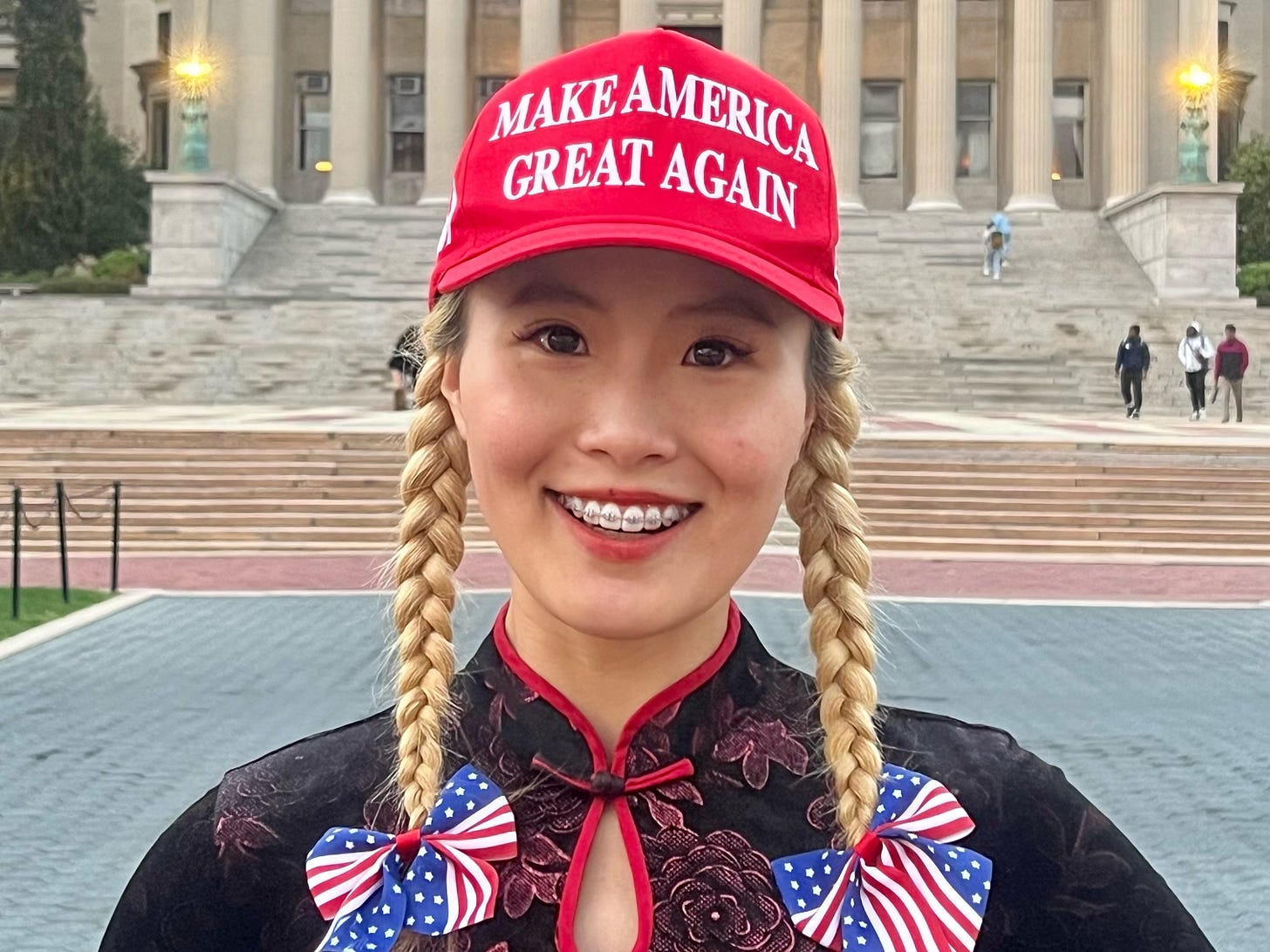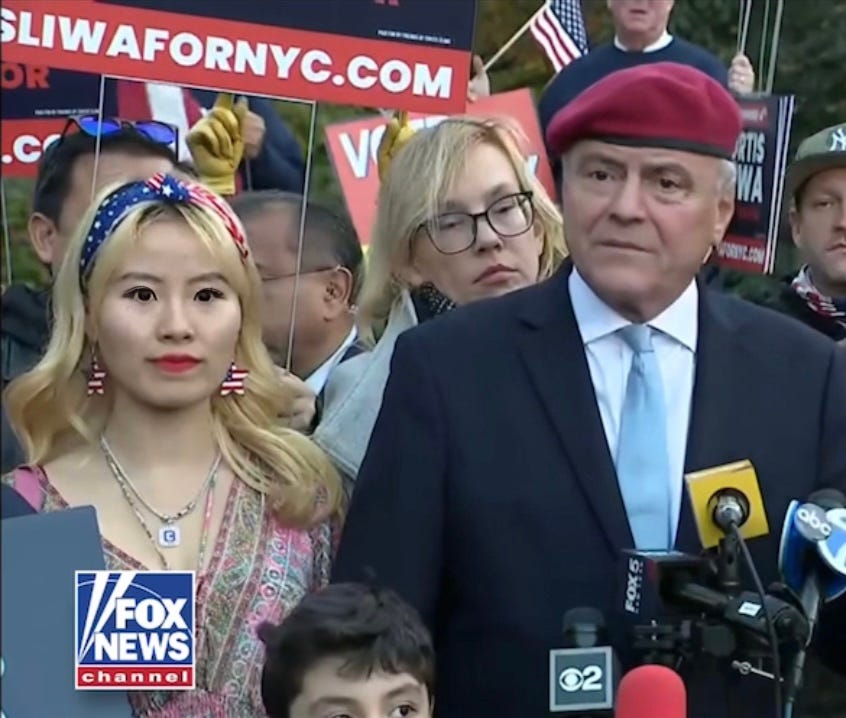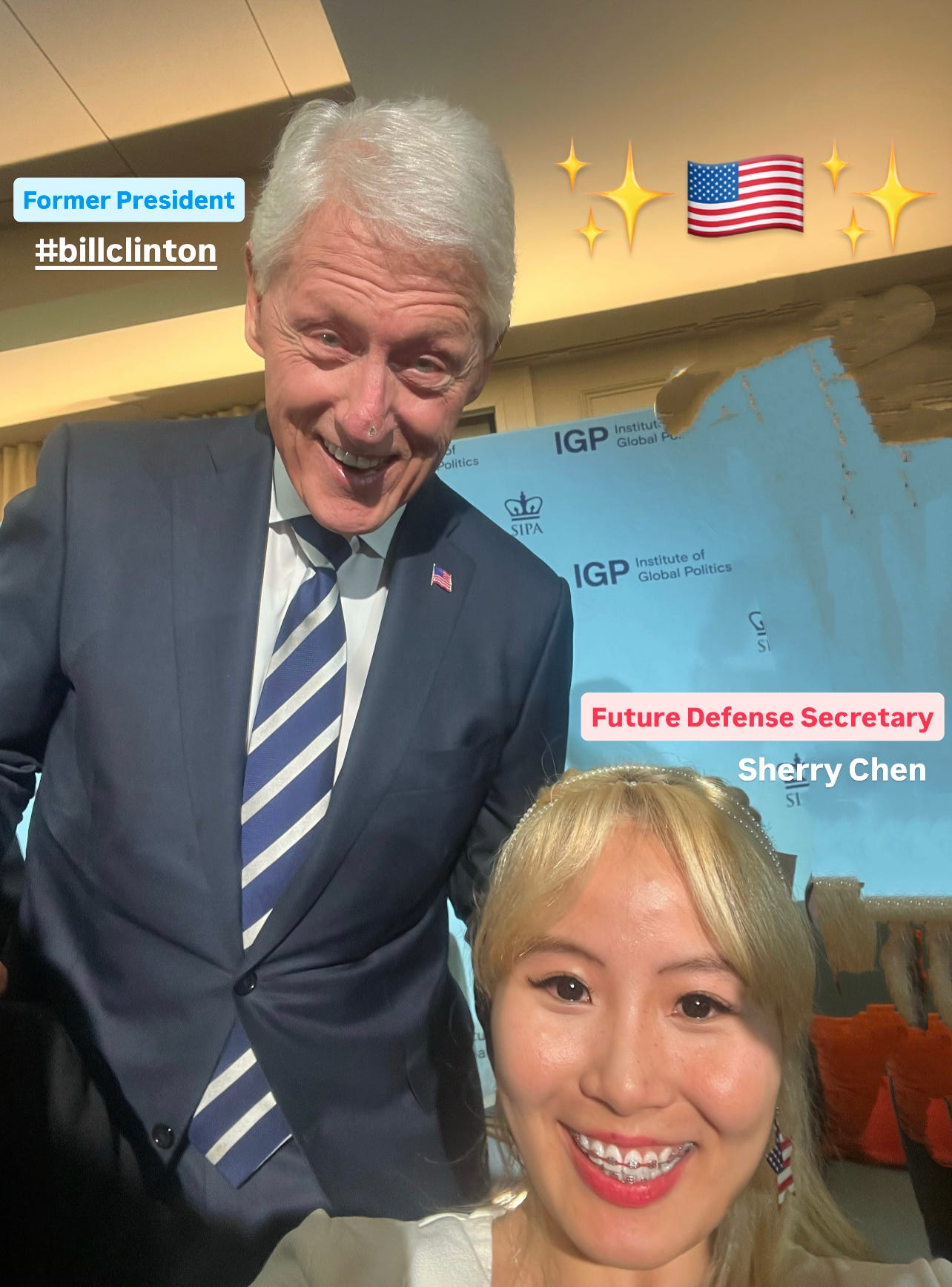I’m the Girl You See Wearing a MAGA Hat on Campus
I put on my red hat to demonstrate Columbia’s commitment to free speech.
A year ago, I “came out” by posting myself with a MAGA hat on my Instagram story the day Trump was re-elected. Some liberal students doxxed me, and I lost about one-tenth of my followers. One year later, the atmosphere feels completely different. When I wear my MAGA hat on campus, people smile and say, “I love your hat.” Some ask to take photos with me; others invite me to be interviewed or write for campus publications. No matter what anyone’s reaction is, I’ve remained open about my beliefs: I am a pro-Trump, right-wing, conservative Republican.
I wear my MAGA hat for three reasons: To express my patriotic belief in “Make America Great Again,” show my political identity as a pro-Trump conservative Republican, and demonstrate that Columbia truly upholds free speech.
There is an important distinction between social pressure against and institutional oppression of free speech. If you express an unpopular opinion, you may face criticism or even social isolation—but that is not the same as being silenced by institutional authority. As long as you respect community standards and student conduct rules, the University will not punish you for your beliefs. I believe Columbia upholds these standards, contrary to popular belief.
Many assume that openly declaring conservative Republican stances is taboo at Columbia, where most students and faculty lean progressive and many strongly oppose Trump. Yet the fact that I can wear my MAGA hat freely—and even receive compliments for it—shows that Columbia University, at its institutional core, upholds free speech for everyone, no matter if your opinion is popular or not.
I admire President Trump’s strength, courage, and resilience. Within a year of taking office, he secured the border, defended women’s sports, deployed the national guard to restore order in cities across the nation, fought drug cartels, deported criminals, and revived free speech by ending federal censorship on online content. He has survived assassination attempts and brokered eight peace deals on top of the historic Abraham Accords. His principle of “peace through strength” reflects the defense philosophy I seek to embody in my own career goal to become U.S. Secretary of Defense.
Trump also turns criticism into humor—a mark of true confidence. As he reminded graduates at the University of Alabama at Birmingham earlier this year, “with drive and ambition, young people can do anything.” That belief motivates me every day. I do not agree with everything Trump does or says, but I deeply admire and seek to learn from his leadership.
My combination of clothing and accessories—a MAGA hat, American flag bows, a Columbia shirt, and a traditional Chinese dress—displays my experience and beliefs in a way that feels authentic to me.
In my view, style is a crucial channel of expression and a bridge for dialogue. I welcome all comments on my fashion and treat them as opportunities to engage with my peers in conversation. For example, I’ve interacted with some international students who seemed puzzled by my American flag bows, yet warmly complimented my Chinese traditional dress. In contrast, American Patriots—students, TAs, professors, and others—I’ve spoken with have praised my bows and American attire.
Many think my comfort with expressing my views stems from self-confidence. That is only part of the story. Beyond trust in myself, I trust the U.S. Constitution and Columbia’s principles, both of which protect free speech. Recent articles and data from the Foundation for Individual Rights and Expression (FIRE) argue that Columbia’s free speech environment is abysmal. I disagree. I maintain that Columbia endorses free speech for everybody on an institutional level. The school’s official social media account often highlights my presence, such as on the first day of school, during sports events, and at the World Leaders Forum. It’s likely because of my constitutional charisma—the aura of “Life, Liberty, and the Pursuit of Happiness.”
One reason critics claim Columbia ranks poorly in free speech is because they overemphasize protest as the main measure of expression. In reality, there are many legitimate channels to voice one’s views— academic forums, student organizations, and campus publications, among others. Speaking through proper channels is just as important as the content of what you say.
In fact, the school regulates protests not to suppress free speech, but to prevent disruption and ensure that all students can learn in a safe and orderly environment. The boundary between expression and disruption is not always clear. I remember one afternoon during finals when masked protesters entered Butler Library—students were forced to evacuate, unable to study for their exams. Sundial, the Blue and White, and the Columbia Daily Spectator wrote articles about the protest, all with vastly different styles of coverage.
These moments raise difficult questions: How should we interpret the right to “peaceful assembly”? Does being “unarmed” automatically make a protest peaceful? If a demonstration occupies public space for weeks or months, disrupts University operations, causes physical damage, or makes students feel unsafe, can it still be described as peaceful? What justifies prioritizing protesters’ demands over the rights of students who simply want to learn?
Paradoxically, those who feel “oppressed” sometimes attempt to dominate the discourse and downplay the other perspectives—and when the system does not prioritize their voice or satisfy their needs, they claim they are “silenced.” In reality, a fair system prioritizes no one.
From my perspective, the right to express yourself does not obligate others to listen. Whether you are heard and trusted depends on your capability, not on institutional enforcement. I share my opinions on my personal social media, but I don’t force anyone to pay attention or agree with my views. For example, I share my thoughts on lawful versus unlawful immigration, gender roles, and international relations. If people are influenced by what I say, it is because of their own choice, not because of my coercion.
When it comes to using public platforms or University resources to express my views, I am careful to follow proper procedures and respect institutional guidelines. I speak in high-level academic forums, engage in student organizations, and publish in campus newspapers, which are all legitimate channels to voice my opinions to the school community.
Wearing a MAGA hat does not mean that I am an ideologue. I am inclusive to other beliefs and ideas. Inclusion means two things to me. First, I do not try to change the views of those who disagree with me. Second, I am willing—and eager—to hear opinions that are not my own.
For example, I uphold the conservative vision of gender roles articulated by the late Charlie Kirk. Kirk called on men to protect and provide, to commit before intimacy, and to treat women with honor. He called on women to respect life, take ownership of their choices, and recognize their worth. This is the conservative vision of the two genders: men and women collaborating and supporting each other, each fulfilling their respective responsibilities.
That said, my strong beliefs do not stop me from engaging with leftist arguments. I have completed all the required DEI orientation modules, even though I do not agree with the training’s structure. Furthermore, I chose my University Writing section on “Gender and Sexuality,” which included non-binary perspectives. In the course, I conversed with classmates who rejected the idea of the gender binary.
With an open-minded attitude, I proactively attend various University clubs to engage with diverse perspectives. I’ve been to both CUCR and CU Democrats club meetings, as well as events hosted by organizations such as Bridge Columbia and Turning Point USA. The fact that I, a MAGA Trump Republican, have been welcomed into so many clubs and discussions across campus shows that, beyond political stereotypes, many Columbia students value dialogue more than conformity. The willingness of these groups to engage across ideological lines suggests that Columbia’s intellectual culture—while predominantly progressive—still leaves valuable space for principled dissent.
This mentality extends beyond interactions with my classmates. I’ve been encouraged and complimented by liberal professors of mine to canvass for Curtis Sliwa, demonstrating that they value civic participation over partisanship.
In my lectures and seminars, faculty consistently invite students to analyze different political systems through evidence and theory rather than ideological inclination. I also recently attended an event at the Columbia SIPA Institute of Global Politics where former Secretaries of State Mike Pompeo and Hillary Clinton sat together on stage, sharing insights with students across political divides. These experiences remind me that Columbia’s academic spirit champions intellectual rigor over political orthodoxy. In my view, the University’s true strength lies in teaching us how to think, not what to think.
Rational disagreement stems from intellectual pluralism, and making it visible strengthens our community. By contrast, disciplining speech to conform to political correctness is a real threat to democracy. We can—and should—debate how to interpret and implement certain policies. But this is only possible if we actively pursue common ground. That common ground is neither DEI nor any religion—it is the Constitution, the foundational framework of our American liberty and democracy.
Wearing a MAGA hat at Columbia proves that true free speech still exists at the institutional level, even when social pressures make political expression difficult. Columbia’s commitment to equality of expression reflects the enduring strength of the U.S. Constitution, and its ability to protect We the People.
Sherry Chen is a senior in the SciencesPo dual degree program. She is a guest contributor for Sundial.
The opinions expressed in this article are solely those of the author and do not necessarily reflect the views of the Sundial editorial board as a whole or any other members of the staff.
For those interested in submitting a response to this article, please contact us at columbia.sundial@gmail.com.





Aside from all of the talking points and glazing, there are just a lot of factual issues.
"the University will not punish you for your beliefs." - The University has explicitly intimidated and threatened to punish people for their beliefs. Read Daniel DiMartino's article in the NY Post last year, where they called him in and threatened him over tweeting mainstream Catholic views.
"MAGA hat freely—and even receive compliments for it—shows that Columbia University, at its institutional core, upholds free speech" - That's a logical fallacy. As stated earlier in the article, the social repression is not the same as institutional oppression. Also, a naturalistic fallacy regarding the existence of you being able to wear the hat and conflating that with what the institution says ought happen.
"he reminded graduates at the University of Alabama at Birmingham earlier this year" - This was in Tuscaloosa, not Birmingham.
"Wearing a MAGA hat at Columbia proves that true free speech still exists at the institutional level" - This logic is pervasive throughout the article, but that is just not a conclusion that can be drawn from the premise. Free speech is not solely defined by the ability to wear a hat.
Anyone who has been on campus knows that there is a certain set of ideas that a determined to be acceptable.
Thank you, Sherry, for elucidating this positive point of view. Based on other reports I’ve read, I wonder whether you’ve painted too rosy a picture of free speech at Columbia. For example, is the tolerance accorded by professors to your expression of conservative views in the classroom typical of the Columbia faculty? It would be wonderful if it is, but I have read several reports to the contrary.